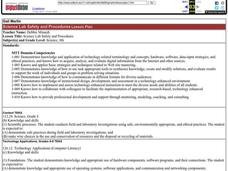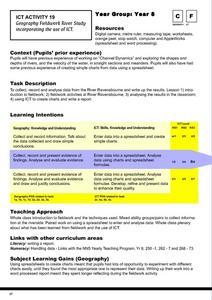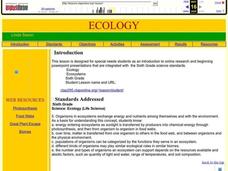College Board
2003 AP® Computer Science A Free-Response Questions
You deserve a C++. Released items from the last year of C++ programming for the AP Computer science course provides opportunities to practice. Pupils use the questions to develop their programming skills by finding solutions to the...
College Board
2000 AP® Computer Science A Free-Response Questions
Coding works for other fields. The free-response questions for AP Computer science require pupils to develop code to solve a problem. Problems range from creating a histogram to developing an encryption program. Teachers use the...
College Board
2002 AP® Computer Science A Free-Response Questions
Find the data in an array. Questions for the 2002 AP® Computer Science exam provide opportunities for practice using their ability to use an array structure. Four questions provide different scenarios to use arrays. Pupils then create...
College Board
2001 AP® Computer Science A Free-Response Questions
Develop an array of solutions. The released questions provide an insight on how to use C++ programming to work with arrays. Pupils respond to the questions by creating lines of code to accomplish specific tasks. The 2001 exam uses the...
Google
Adventure on the High Seas
Ahoy there! A fun computer science lesson plan challenges pupils to write a program that creates an ocean wave. They then develop stories to accompany their projects. All of this takes place within the Scratch coding program.
TryEngineering
Program Your Own Game
Young computer scientists get to see what it's like to be a software engineer as they use free online software to design a computer game. They play and evaluate games groups created to round out the activity.
Curated OER
Welcome To Program A Simple Program in C
Students are introduced to the language in C programming. In groups, they determine the correct function to be used and practice running the program to achieve the desired results. They end the lesson plan by programming more difficult...
Drexel University
Learning Roomba Module 3: Controlling Movement
Look at it go. The resource, the third in a series of five using a Roomba, explains the different types of movements a Roomba makes, then challenges pupils to create computer codes that will cause the Roomba to travel specific paths.
Beauty and Joy of Computing
Conditional Blocks
If you use the resource, then pupils will understand conditional block instructions. In the first lab of a six-part unit, pupils learn how to use conditional statements (if/then) in block instructions for computer programming. They apply...
Institute of Electrical and Electronics Engineers
Arduino Blink Challenge
Emerging engineers read about Arduino software and how it can be used. Then they follow a nine-step tutorial to connect an Arduino board to a computer and put it to work! The objective is to code a program that will cause an LED to...
TryEngineering
Circuits and Boolean Expressions
Teach basic logic using Boolean operators. Young computer scientists learn about the operators NOT, AND, and OR, and how they can be expressed using Boolean notation, logic gates, or truth tables. Along the way, they learn about half...
Beauty and Joy of Computing
Nesting Lists
Create lists within lists. The second lab in a series of five in the unit has pupils develop a simple contact list app. The tasks within the lab build the need for an abstract data type. Individuals build more complexity into their...
Curated OER
Variable Arrays
Twelfth graders compare and contrast variables and arrays. Using data, they enter the information into a spreadsheet and an array to compare how they appear. To end the lesson, they complete basic programs in which they use arrays.
Curated OER
Science Lab Safety Procedures
Eighth graders watch a Lab Safety video and discuss particular questions related to lab safety. Lab equipment is then distributed and the students inspect the equipment and record their finding in their journal. Finally, in groups, 8th...
Curated OER
Collecting S.O.C.K.S
Students participate in the Collection S.O.C.K.S program to protect their local watersheds. Using the socks, they plant new plants and trees around the watershed in order to protect it for future use. They also perform in a skit that...
Curated OER
Life Cycles
Using computers, Students work in small groups and progress through the roles of Explorer, Researcher, Designer, and Evaluator as they study the life cycle of plants, insects, butterflies and frogs.
Curated OER
Geography Fieldwork River Study
Eighth graders collect, record, and analyze data from a local river and input the data into the computer. They collect and record the information, discuss the data collected, and enter the data into a spreadsheet and charts to compare...
Curated OER
What's the Matter?
Students explore matter. In this matter and technology lesson, students locate examples of solids, liquids, and gases inside and outside the classroom, and record their findings in a graphic organizer. Students listen to the book What...
Curated OER
Making Big Cats' Web Pages
Learners investigate the lives of big cats by creating a website. In this web design lesson plan, students examine web authoring software in pairs as they read books on big cats. Learners share their web page creations with the class...
Curated OER
Ecology
Sixth graders are introduced to online research and beginning PowerPoint presentations that are integrated. They pass a plant and photosynthesis. Students locate information on a self selected animal online. They give a PowerPoint...
Curated OER
My 5 Senses Book
Pupils create a 5 page My 5 Senses book. They type 1 sense on each page and select 4 corresponding pictures to go with the sense.






















